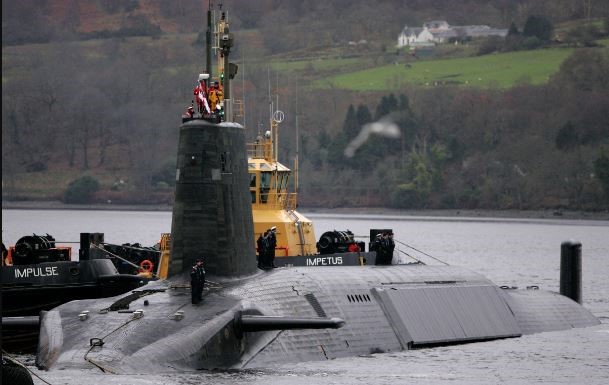LONDON: Britain’s Trident nuclear deterrent failed during a test last month, sending a missile crashing into the ocean off the coast of Florida near the submarine that launched it, The Sun newspaper reported on Wednesday.
The Ministry of Defense confirmed there was an “anomaly” during the test, but said the UK’s “nuclear deterrent remains safe, secure and effective”.
With Defense Secretary Grant Shapps on board HMS Vanguard witnessing the test, The Sun reported, the rocket’s first booster stage – fitted with dummy warheads – failed to ignite.
The result marked the second failed test of a Trident missile in a row after one veered off course in 2016, an embarrassing outcome for a country that once boasted the world’s largest and most powerful naval force.
“It left the submarine but it just exploded, right next to them,” The Sun quoted an unspecified source as saying.
In a statement, Shapps said the missile test was the culmination of a Demonstration and Shakedown operation on the Vanguard to gauge the performance of its weapons and crew after it returned from a lengthy overhaul.
He said the operation reaffirmed the effectiveness of Britain’s nuclear deterrent, that the submarine and crew had been “successfully certified” to be operational, but there had been an anomaly that was “event specific”.
“There are no implications for the reliability of the wider Trident missile systems and stockpile,” he said. “Nor are there any implications for our ability to detonate our nuclear weapons should the circumstances arise in which we must do so.”
UNDER CONTROL
The government could face questions about the failure and the fact that it was reported by the media at a time of heightened international tensions, with the UK Navy’s preparedness under scrutiny should it be drawn into a full-blown conflict.
Earlier this month, one of Britain’s two flagship aircraft carriers, HMS Queen Elizabeth, had to be pulled from NATO’s biggest exercise since the Cold War due to a propeller problem.
Matthew Savill, director of Military Sciences at the Royal United Services Institute, a defense and security think tank, said the nuclear powers were monitoring each other’s tests.
“China and Russia will be watching this and will almost certainly find that there was no (successful) missile launch,” he said.
Britain’s nuclear deterrent is provided by a fleet of four nuclear submarines equipped with the US-made Trident ballistic missile system, manufactured by Lockheed Martin. The heads are made in Britain.
Britain and the US say they have successfully tested the Trident missile system more than 190 times.
Britain’s nuclear deterrent costs around £3 billion ($3.8 billion) a year to operate – roughly 6% of the total defense budget. In 2016, Parliament approved the construction of a new class of submarines to be commissioned in the 2030s at a cost last estimated at £31bn.
RUSI’s Savill said this meant the Vanguard fleet was operating beyond its expected lifespan.
“They are working on the basis that the Vanguard submarines will be at least a decade longer than their original lifespan,” he told Reuters. “And that creates stress and tension in the system.”
According to the Royal Navy website, there has always been a British ballistic missile submarine at sea since 1969 and that “a credible nuclear deterrent depends on the ability to threaten an assured and effective response to aggression”.







